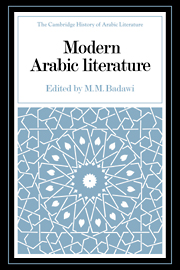Book contents
- Frontmatter
- Contents
- Editorial Note
- Chronological table of events
- Map of the Arab World
- 1 Introduction
- 2 The Neo-classical Arabic poets
- 3 The Romantic poets
- 4 Modernist poetry in Arabic
- 5 The beginnings of the Arabic novel
- 6 The mature Arabic novel outside Egypt
- 7 The Egyptian novel from Zaynab to 1980
- 8 The modern Arabic short story
- 9 Arabic drama: early developments
- 10 Arabic drama since the thirties
- 11 The prose stylists
- 12 The critics
- 13 Arab women writers
- 14 Poetry in the vernacular
- Bibliography
- Index
5 - The beginnings of the Arabic novel
Published online by Cambridge University Press: 28 May 2012
- Frontmatter
- Contents
- Editorial Note
- Chronological table of events
- Map of the Arab World
- 1 Introduction
- 2 The Neo-classical Arabic poets
- 3 The Romantic poets
- 4 Modernist poetry in Arabic
- 5 The beginnings of the Arabic novel
- 6 The mature Arabic novel outside Egypt
- 7 The Egyptian novel from Zaynab to 1980
- 8 The modern Arabic short story
- 9 Arabic drama: early developments
- 10 Arabic drama since the thirties
- 11 The prose stylists
- 12 The critics
- 13 Arab women writers
- 14 Poetry in the vernacular
- Bibliography
- Index
Summary
The beginnings of a fictional tradition in modern Arabic literature are part of the wider process of revival and cultural assimilation known in Arabic as al-Nahḍah. This process involved a creative fusion of two separate forces. One is the rediscovery of the treasures of the Arabic literary heritage and the emergence therefrom of a ‘neo-classical’ movement. The other is the translation of works of European fiction into Arabic, their adaptation and imitation, and the eventual appearance of an indigenous tradition of modern Arabic fiction. Not surprisingly, these two tendencies find themselves pitted against each other during the initial phases of development under the rubrics of ‘traditional’ and ‘modern’.
In the case of fiction, such a ‘revival’ involved the investigation of the earlier tradition of Arabic prose in quest of precedents and models. To a western audience which has come to regard The one thousand and one nights as a great repository of tales, it may seem surprising that, in the process of reexamining the genres of prose writing, there was little recourse to this great collection; it was regarded as a repository of ‘popular’ culture and thus not part of the repertoire under consideration. However, a prose genre which had flourished within the thoroughly rhetoricized tradition of criticism during the preceding centuries was the maqāmah, the initiation of which is attributed to Badīʿ al-zamān al-Hamadhānī (969–1008).
- Type
- Chapter
- Information
- Modern Arabic Literature , pp. 180 - 192Publisher: Cambridge University PressPrint publication year: 1993
- 4
- Cited by



